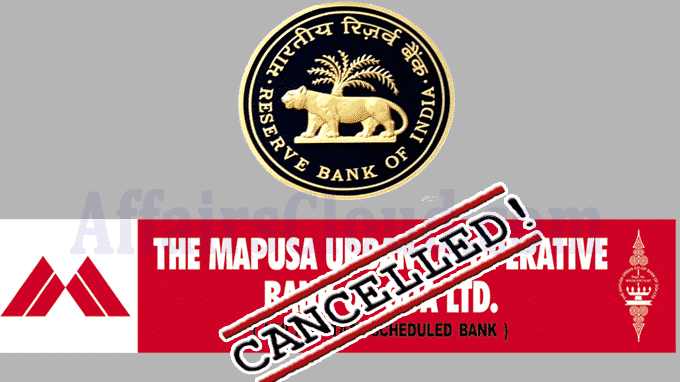India’s central bank, the Reserve Bank of India (RBI) has canceled the license granted to the Mapusa Urban Co-operative Bank of Goa Ltd., Goa to conduct banking business which includes acceptance of deposits and repayment of deposits as defined in Section 5 (b) read with Section 56 of the Banking Regulation Act, 1949 with immediate effect. The order came into effect from the close of business on 16 April 2020. The RBI in its order gave 5 specific reasons for cancelling the licence of the bank. These include,
The RBI in its order gave 5 specific reasons for cancelling the licence of the bank. These include,
- The bank does not have adequate capital structure & income potential. Hence, it does not comply with the provisions of section 11 (1) and section 22 (3) (d) read with section 56 of the Banking Regulation Act, 1949.
- It does not comply with the conditions mentioned in 22(3) (a), 22 (3) (b), 22 (3) (c), 22 (3) (d) and 22 (3) (e) read with section 56 of the Banking Regulation Act, 1949.
- The activities carried out by the bank are adverse to the interest of the depositors;
- The bank will be unable to fully pay its current depositors with their current financial status; And
- Continuing the business of the bank may adversely affect the public interest.
Key Points:
i.In the sequence of cancellation of license and commencement of liquidation work, the process of payment of amount will be initiated to depositors of Mapusa Bank as per Deposit Insurance and Credit Guarantee Corporation (DICGC) Act, 1961.
ii.During the liquidation, every depositor will be entitled to deposit up to Rs. 5 lakh from the DICGC subject to the general terms and conditions.
iii.The RBI also asked the Central Registrar of Co-operative Societies, Government of India (GoI) to issue orders for winding up the business of the bank and appoint a liquidator for the bank.
iv.The Mapusa bank was first placed under direction through an RBI directive dated July 24, 2015 after its Capital to Risk (Weighted) Assets Ratio (CRAR) declined drastically below the RBI’s 9% stipulation.
About CRAR:
Capital to Risk (Weighted) Assets Ratio, also known as Capital adequacy Ratio, is the ratio of a bank’s capital to its risk. RBI monitors the bank’s CAR to ensure that the bank can absorb a better amount of loss and complies with statutory Capital requirements. Higher CRAR indicates a bank is better capitalized.
- As per RBI norms, Indian scheduled commercial banks are required to maintain a CAR of 9% while Indian public sector banks are emphasized to maintain a CAR of 12%.
About Mapusa Urban Co-operative Bank Ltd:
Headquarters– Mapusa, Goa
Managing director– Shailendra Sawant
About Reserve Bank of India (RBI):
Headquarters– Mumbai, Maharashtra
Governor– Shaktikanta Das




